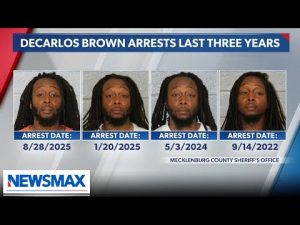The tragic murder of a Ukrainian refugee in Charlotte, North Carolina, is a harsh reminder of the failures in the justice and mental health systems. A young woman, having fled her war-torn homeland in search of a safer and better life, met her untimely death at the hands of a man with a disturbingly long criminal record. This man, DeCarlos Brown Jr., who was released on cashless bail, managed to continue his reign of terror despite having more than a dozen prior arrests, including for armed robbery. It makes one wonder about the efficacy of our systems when those who should be safely confined due to their violent history are instead given a chance to wreak havoc once more.
President Trump has weighed in on the situation, pointing out the presence of evil among us and offering condolences to the victim’s family. However, it seems like acknowledging evil does not suffice. There needs to be action against such threats to society, but instead, we observe the baffling spectacle of a man like Brown freely roaming the streets. When even Brown’s own mother repeatedly warned that he should have been in custody due to his aggressive behavior and schizophrenia diagnosis, yet the court systems ignored these red flags, it’s clear something is rotten in the state of our justice system.
As discussions in the media continue, officials like Transportation Secretary Sean Duffy have vowed to investigate, meanwhile, city officials claim they are bolstering security in response. Yet, one cannot help but wonder if these are mere knee-jerk reactions expected in the aftermath of tragedy, and not true solutions to chronic problems. It is easy for politicians to join the chorus of “increase in security” when perhaps a decent place to start might have been ensuring a dangerous criminal wasn’t allowed back on the streets to begin with.
Charlotte’s mayor, interestingly, seems to have had a change of heart. Initially blaming mental health crises for the attack, the spotlight has now been shifted to call for more security. A peculiar reversal, considering previous inaction on the issue by city officials despite warnings from the Fraternal Order of Police. The police rightly declared that the media should not let this story slip, for it shows systemic failures smudged in the ink of legal documents numbered too high for comfort—failures that cost an innocent life.
The arrest record of the suspect underlines the chaos of a lenient justice system. We see a paradoxical commitment to equity in crime while neglecting the safety of citizens. For voters in Charlotte and beyond, this is a wake-up call. Elected officials are responsible for the protection of their constituents, and they must be held accountable for the conditions they allow. Until voters demand change and choose leaders with logical, practical solutions, this pattern of violence will persist, like a broken record playing over and over.







